Chamois students on Thursday learned quite a bit about how tough life can be without proper education and good choices at a Reality Enrichment and Life Lessons Simulation (REALL) presented by Central …
This item is available in full to subscribers.
We have recently launched a new and improved website. To continue reading, you will need to either log into your subscriber account, or purchase a new subscription.
If you are a current print subscriber, you can set up a free website account by clicking here.
Otherwise, click here to view your options for subscribing.
Please log in to continue |
|
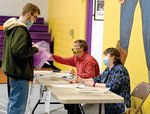


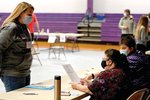
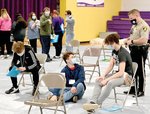
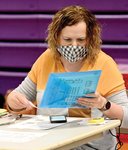
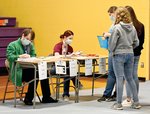
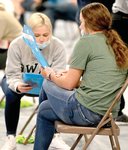
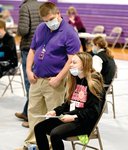
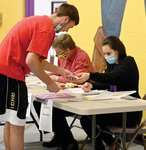
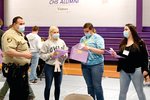


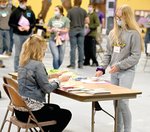

Chamois students on Thursday learned quite a bit about how tough life can be without proper education and good choices at a Reality Enrichment and Life Lessons Simulation (REALL) presented by Central Missouri Community Action (CMCA).
“I think it was an amazing event and it went really well,” said Chamois Counselor Meghan Birmingham. “The students all had positive things to say about the event. I think it helped give them a glimpse of what could happen when they become adults, and that adult life is never as easy as we want it to be. I honestly wish this event was around when I was a student because of the lessons one can learn.”
Chamois has held this event in the past, and CMCA Community Organizer Jenn Millard contacted Birmingham about doing it again.
“I was super excited,” said Birmingham, who worked on getting everything set up on the school side as Millard coordinated volunteers for the event.
REALL is a simulation designed to challenge youth to think critically about how choices and decisions made in adolescence may have consequences in adulthood.
Many of the competencies identified by the Missouri State Board of Education are addressed, including identifying components and sources of income, analyzing how career choice, education, skills, and economic conditions affect income and goal attainment, relating taxes, government transfer payments, and employee benefits to disposable income, and explaining how financial resources affect the choices people make.
“I think this gives students a realistic taste of life,” said Birmingham. “The kids are able to see that life can take a turn very quickly. I think the first round represented the more ideal type of life. The one that we all want and dream of, and the second round represented what could happen and tends to happen to more adults than you think. It was sort of a rude awakening to some of the students who are not used to that kind of life.”
Millard said she was very happy to oversee her first REALL event since becoming the Osage County community organizer, especially since she had just two weeks to plan the simulation once the date was set.
“We knew we had to move quickly with testing and end of school year events coming up,” said Millard. “Meghan has truly been a pleasure to work with and the students have always been so welcoming and respectful. Meghan had knowledge about the simulations but this was her first as a counselor as well. She reached out to the teachers to see if they would be interested in being involved and we had several staff members jump in and help. It was remarkable to see the support, especially the cafeteria staff, who provided snacks, drinks, and cookies.”
Each student in grades 9-12 participated and received a character packet that included information specific to the life they had assumed.
During the reactive session, students lived their lives as if they had made poor decisions in their youth (all have dropped out of high school, some have prior legal histories, some have low paying jobs, etc.). The proactive session focused on someone who made positive choices (all have graduated high school and are employed at a living wage).
In each session, students were required to handle the basics of being an adult, from earning income to paying bills and buying groceries. Those with children were required to establish daycare and manage dropping them off and picking them up. A time limit added pressure to the scenarios.
“I think the best parts were how the kids were able to see what different resources were out there and how they can get help if they need it,” said Birmingham. “Also it was great that the kids were able to see how hard it could be when you have just a certain amount of money and you need to choose what you are going to pay that month or week. The event allowed them to see that there are consequences to their choices, good or bad. They had to deal with those consequences and some of the students were not ready for that. This helped them see that making good choices is important and not just something that we as teachers or their parents just tell them.”
Senior Veronica Slack’s character was “Earnhart” who for the proactive session was a teacher married to a banker with three-year-old twins, a brand new car, a paid off-house she considered renovating. “I played golf for fun on the weekends,” Slack added.
The reactive round was a much different story. Slack’s character was an ex-convict who was unemployed and married, living in a hotel with three kids who were 1, 7, and, 11. “I had a car but the insurance was a week from expiring,” she said. "I had to check in with my parole officer and had to take parenting classes to keep my kids.”
For Slack, the most challenging aspect of the event was having to manage her time and money in both sessions. “It always seemed like I was running out of time or money but I never left my kid in daycare,” she added. “ The longer we were in the program, the easier it was to manage. I learned when I needed to do certain things and what times to do things to accomplish them the best.”
Slack had gone through the program before so she knew what to expect but said it was an eye-opening experience nonetheless. “I will be going to college next year and these are obstacles I will have to face,” she said. “I learned that there are consequences for your actions. Our parents are not always going to be there to support us and the choices we make might have negative actions on our lives. This was a good learning experience to show the good and bad choices we can make in our lives.”
Fellow senior Eli Deppe’s character was “Allison,” who had completely different lives.
In the proactive session, he was a teacher, married with two kids, drove a minivan, and had a brand new truck. In the reactive session, Deppe had two kids and was being evicted from his house. “I had to talk to my social service worker otherwise I would lose my kids,” said Deppe. “The most difficult thing was trying to get everything done in one day but after a few times, I got the hang of it.”
He added that time management was the biggest lesson he learned from the event.
Senior MaKenna Wuelling saw two very different scenarios.
In the reactive session, “Colin” lived paycheck by paycheck. “I was pregnant,” Wuelling said. “I lived with my husband, who worked one day a week, and I had a full-time job the whole time.”
By contrast, in the proactive session, she was a teacher with a Master’s Degree. Her stay-at-home husband cared for their three children, and her car was paid off.
“I think the most difficult thing was just trying to keep everything straight between all of the things I was paying for in the proactive part,” said Wuelling. “Since I have been through this before I had a bigger idea on what to do and it was smoother. When I was doing the reactive life, it did teach me a lot because I was learning how to live paycheck to paycheck and how to divide up the money to keep my home and my job.”
The biggest life lesson she learned was to save money. “Spend your money on the important things and always get a receipt of things that you paid,” Wuelling added.
Senior Katie Keilholz played “Harris,” who struggled during the reactive session.
“I had a small paycheck that barely got me by each week,” said Keilholz. “I was pregnant so at least I didn't have to worry about paying for daycare. I didn't like the feeling of not having a lot of money and having to make small payments each week because I did not have enough to pay the full amount each week.”
In the proactive session, Keilholz had a Master's in Education and was a teacher with three kids that stayed at home with her husband. Keilholz had $15,000 in savings, which was very helpful, but she learned that money isn’t the only thing to worry about.
“The first week, I left my kids in the daycare, and in the second week, I picked up the wrong kids,” said Keilholz. “Even though the kids were just paper cutouts, I felt the stress of having to worry about making it to my job in time, picking up the kids, and paying off all the bills in time. I never ended up in jail, so that was a good thing.”
One student, RJ Hagenhoff, spent time in jail because he put his two "kids" in his pocket and went to work instead of dropping them off at daycare.
Keilholz added that this was an eye-opener to what real life actually could be like. “The most difficult aspect was trying to manage the time given to accomplish everything that needed to be accomplished,” Keilholz added. “I realized time and money management is very important. After a couple of weeks, I figured out a system of going straight to work and then cashing that check to pay off my bills but instead of trying to pay all of them at one time, I went to specific tables and got the major ones paid off first. However, always remember to get a receipt. I experienced this same simulation during my freshman year but I definitely took it better this year because since then I have learned how to manage my time since then so I used that aspect during the simulation to help me.”
The biggest life lesson she learned is to manage her time and money. “I know that I need to save money because you never know what life crisis might happen where you need some extra cash,” Keilholz said.
Junior Julissa Mitchem lived life as “Davison” for the event.
During the reactive session, she was a high school dropout and had no further education. “I had one two-year-old and a five-year-old that was living with another parent. I had to pay child support along with going to parenting classes every week.”
Mitchem had no job and was homeless, staying at a shelter. She was on food stamps but still struggled. Mitchem was an ex-convict (drugs), which led to having to check in with her parole officer every week.
“On top of that, I had to check in to see if any job openings were available,” said Mitchem. “I struggled to pay for many different things, which led to asking for help from the CMCA booth in which I was able to get my rent paid for, my child in Head Start, and $50 for groceries. In the end, I still didn’t have enough money to pay all my child support and was only left with $5.”
By contrast, in the proactive session, Mitchem worked at a heating and air conditioning place, had her own vehicle, no kids, and a place that she rented out. “My dream was to buy my own house,” she said. “I ended up getting all of my bills paid on time along with having enough money to buy luxury items.”
Still, Mitchem saw the entire event as a challenge. “I think that none of it was easy to manage,” she said. “The second session was a lot more stressful than the first one. The biggest life lesson that I learned from this was that you should always stay on top of things and always try to further your education in any way possible. Also, make smart choices in any way possible, and if you need help, reach out for it. I will use this event greatly because it showed me what life would be like if I made bad choices and how stressful life could be.”
Junior Abigail Keilholz’s character, Diley, was accused multiple times of trying to kidnap children and was questioned several times by the Osage County Sheriff’s Office. However, there was no evidence to support the claims.
In the reactive session, Keilholz had a child to care for and very little money to manage her life, which made it by far the most difficult part of the simulation.
“It was all extremely difficult except for me asking for receipts because I always do that in real life,” said Keilholz, who offered this bit of advice based on what she learned: “Make sure you can manage your own life before you bring someone into this world.”
Audrain County Community Organizer Tad Dobyns led the event due to his experience with REALL and said the students' reactions in both sessions were similar to what he has seen when doing this simulation.
“More students were relaxed and concentrating on getting their bills and basic needs paid for and met along with time management in the proactive session,” he said. “In the reactive portion of the simulation, students were just trying to figure out HOW to TRY to meet their basic requirements (rent, groceries, daycare, utilities, etc.) while adding extra stops in their week to see their probation officer or applying for a job. I was surprised at the number of students who figured out what were, and how to utilize the additional resource tables in an effort to help their situation during the reactive portion of the simulation. Also, I was glad to see the students discussing amongst themselves on how to address their situations.”
Transportation, budgeting, time management, and not asking for receipts when they paid their rent and utilities were among the biggest challenges. “If you are paying with cash for items, it is always a good policy to obtain a receipt from the business,” said Dobyns. “I am a firm believer that students who participate in the REALL simulations each have a different ‘take-away’ from the event. Whether it be the cost of living, budgeting, parenting expectations, time management, the importance of obtaining a high school diploma, or even being sure to obtain a receipt when paying for something in cash, I think each student comes away with an ‘a-ha’ moment.”
Dobyns added that it is important for students to realize the need to obtain that high school diploma while they are in high school. “Once someone drops out, life can throw several more barriers and situations at them that may decrease their ability or want to attend HiSET (GED) classes,” he said.
Though Chamois does not show an issue of students dropping out of school, Millard said she believes students got a better understanding of the importance of staying in school as well as gaining another perspective of their parents/caretakers. ”They encountered issues of managing money, caring for children, inadequate education, inadequate income, and more,” said Millard. “With this, they had to be challenged to make decisions that they may have never even experienced and were shown how their decisions will and can affect their futures.”
Dobyns shared the importance of education as it relates to earning potential.
According to the US Census, earnings in the last 12 months in Missouri vary, with dropouts making $23,275, followed by those with a high school diploma or equivalency ($30,658), some college/Associate’s Degree ($35,102), Bachelor’s Degree ($50,042), and graduate or professional degree ($62,076).
Substance abuse was identified by Dobyns as a contributing factor to difficulties with obtaining a higher education.
“We cannot tell from this data if substance use issues ‘caused’ the person not to reach a higher education level, or if lower education levels ‘caused the person to abuse substances,” he said. “All that we can say with confidence is that ‘a correlation exists’ between the two.”
Millard said this event would not have been possible without the efforts of many volunteers:
Karen Muenks with Three Rivers Electric (Utilities & Phone Company), Steve Duncan (banker),
Osage County University of Missouri Extension Engagement Specialist Elizabeth Anderson (mortgage company), Cpt. Travis Shaffer, Sgt. Richard Jarvis, and Sheriff Michael Bonham (law enforcement and jail), Juvenile Officer Matthew Wright (probation officer), State Technical College Admissions Representative Ross Dickneite and Penny Boillot with Osage County Special Services (employer’s office), and Osage County Special Services Executive Director Megan Reichart (Social Services).
Several teachers and administrators provided assistance during the event as well.
CMCA employees also provided a role, including home-based administrator Shelly Weed (employment office), Linn Head Start Site Director Brooke Weed (Learning Center). Some of the other CMCA staff came from Boone County, Callaway County, Audrain County, and Cooper/Howard County.
Superintendent Lyle Best expressed his appreciation to Millard for organizing the event, and to all of the volunteers for participating. “We believe the program is very beneficial to our students and hope to continue the partnership in the future,” he said.
Principal Jeremy McKague added that he believes this simulation will resonate with students as they prepare for life after high school.
“Just like the mock crash, they see life can change quickly,” he said. “Understanding how to deal with those changes is very important, and even though this was a simulation, I think they will take what they learned here today and use it.”